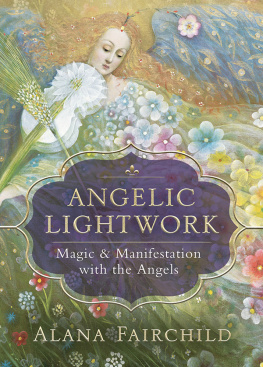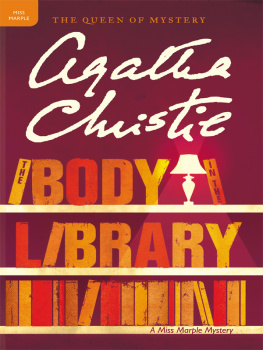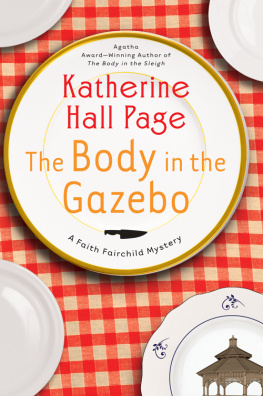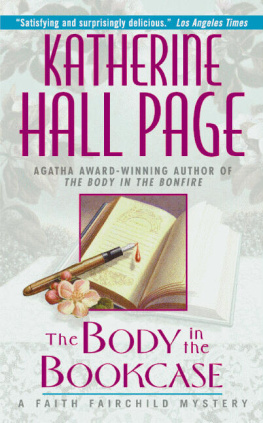Katherine Page - The Body in the Vestibule
Here you can read online Katherine Page - The Body in the Vestibule full text of the book (entire story) in english for free. Download pdf and epub, get meaning, cover and reviews about this ebook. genre: History. Description of the work, (preface) as well as reviews are available. Best literature library LitArk.com created for fans of good reading and offers a wide selection of genres:
Romance novel
Science fiction
Adventure
Detective
Science
History
Home and family
Prose
Art
Politics
Computer
Non-fiction
Religion
Business
Children
Humor
Choose a favorite category and find really read worthwhile books. Enjoy immersion in the world of imagination, feel the emotions of the characters or learn something new for yourself, make an fascinating discovery.

- Book:The Body in the Vestibule
- Author:
- Genre:
- Rating:3 / 5
- Favourites:Add to favourites
- Your mark:
- 60
- 1
- 2
- 3
- 4
- 5
The Body in the Vestibule: summary, description and annotation
We offer to read an annotation, description, summary or preface (depends on what the author of the book "The Body in the Vestibule" wrote himself). If you haven't found the necessary information about the book — write in the comments, we will try to find it.
The Body in the Vestibule — read online for free the complete book (whole text) full work
Below is the text of the book, divided by pages. System saving the place of the last page read, allows you to conveniently read the book "The Body in the Vestibule" online for free, without having to search again every time where you left off. Put a bookmark, and you can go to the page where you finished reading at any time.
Font size:
Interval:
Bookmark:
The Body in the Vestibule
(Faith Fairchild #4)
by Katherine Hall Page
One

There are many ghosts in the city of Lyon. Some appear at twilighton the Place Bellecour when a couple strolling across the large, open square may find the shadows suddenly deepened, the breeze cooled by the memory of the guillotine that once filled the gardens with cries for blood.
Other ghosts wait until the city is dark and different noises fill the traboules, the long, ancient passageways snaking down from the Croix Rousse colline to the quais below. These are the sounds of the silk workers, hungry, exhausted, leaving the clatter of the looms to carry the richly glowing brocades to the waiting ships.
Sometimes, the night watchman at the Musee des Beaux-Arts thinks he hears nuns chanting, looks out the window into the ancient cloister, notes the rustling leaves in the birch trees, and quickly crosses himself.
Then there are the ghosts that are not ghosts, the shadows that move rapidly up the steep stairs from the Place des Terreaux and vanish into the traboules. The next day, a child hastening to school may kick aside an empty syringe, stumble across some broken glass, smell the night smells, and emerge gratefully into the morning air.
To know the city is to know all the ghosts.
Faith Sibley Fairchild waited impatiently for the light to change on the Quai St. Antoine so she could get to the open-air market on the other side of the street. Several times, she was tempted to dart across the traffic, yet after a week in Lyon, she had not only learned which baker had the best bread but that French drivers would not hesitate to mow you down if you put so much as a toe in the way of their Renaults and Peugeotsrespectable-looking individuals hurling quite unrespectable phrases out the window in the process. It was just like Boston, in fact.
She swung her empty straw market basket, herpanier, idly back and forth. Despite the delay, she felt a lovely sense of well-being. Her husband, the Reverend Thomas Fair-child, was happily engaged in work; her three-year-old son, Benjamin, was happily playing at nursery school; she'd happily made it through four enervating months of pregnancy and still wanted to have a baby; andmost important of allshe was in France for a month. It had been a wonderful incentive for getting over morning sickness, which in Faith's case came like clockwork at dinnertime. The idea of passing up the fabled food of Lyon was unthinkable. Whatever the reason, this pregnancy had been better than the first, or rather less worse, and now all her appetites were back.
And at four months, she did not have the sensation of two bodies occupying the same and equal amount of space at one time, which was contrary to somebody's law, and, recalling the experience now, Faith felt, should surely be against whoever's it was. Four months was a little gift from nature, a hiatus of sorts, to allow prospective parents to paint the nursery, read thirty or forty books of baby names, and, if so gifted or inclinedFaith was neitherknit a bootie or two before settling in for the long stretch. It was a time when you thought of soft little bottoms and tiny kissable fingers, not dirty diapers or sleepless nights. Well-being was exactly right. She felt well right down to her toenails and even slightly mellow, edges blurred. This was a very different Faith from the one normally known to her near and dear. That Faith's crisp judgments about the world and its inhabitants were swiftly uttered more often than not. Now they were hidden in some warm, fluffy corner of her brain. She was enjoying this kinder, gentler state for the moment, secure in the knowledge that it wouldn't last long and soon she'd be back in full form.
It was a long light and the traffic continued to stream by. Faith's mind wandered back to the February afternoon when Tom had come home with the news that he had an opportunity to spend a month in France working on his dissertation. She'd been huddled on the living room sofa, wrapped in a down comforter, trying to convince herself that she had made a wise choice when she left a glittering career as one of Manhattan's most successful caterers to be a parson's wife and mother of one and two-ninths children in the small (and at present very cold) village of Aleford, Massachusetts. Tom, rosy-cheeked from the frosty air, his thick reddish brown hair hatless, his coat unbuttoned, had come bounding through the front door, lustily singing "La Marseillaise" at the top of his voice. The sight of all that energy was so galling, Faith had wanted to throw something at him. But there had been nothing at hand and it would have required too much effort to get up.
He'd grabbed her and cried, "Faith, ma cherie, we're going to France! Soon! April, if I can swing it!
Tom had spent an undergraduate year in Paris, devel- oping a fluency in the language and a permanent love affair with the country. He'd also acquired a number of friends, and if he was currently no longer in touch with a certain Simone, he was with Paul Leblanc, a graduate student who'd lived in the same pension. It was a letter from Paul, now in the history department at the Universite de Lyon, that Tom was waving ecstatically as he told Faith of the proposal. Paul had learned he could bring in visiting scholars to give a lecture or two, offering them a small honorarium and the chance to do research at the university in return. He'd known Tom had been struggling to finish his work on the effects of the Albigensian heresy in twelfth-century France on subsequent Christian practice and he thought his old friend might want to make use of the university's famous library. Tom most certainly did.
I've checked the calendar and you know Easter is early this year. I'd have to be here then, of course, but we could leave by the middle of April. I can get people to cover the pulpit for a month. Lord knows, I've done it often enough myself for others."
I'm sure He does," Faith agreed, her mindand bodyin a whirl. "But, darling, what about the restall the meetings, the hand-holdings, not to mention the serious stuff?
Tom had been momentarily perturbed. "I've been wrestling with that all afternoon. The opportunity to finish my doctoral work is important to the parish, certainly, except I know I want to go just for the fun of it, too. Maybe even mostly. I'm sure First Parish could survive for a month without me, probably a whole lot longer, but
Faith had interrupted him there. Lyon was in the southern part of France. It would be warm. Her way was clear.
As it turned out, the congregation was unanimous in its support and in typical Yankee fashion seemed to be looking forward to coping on its own in novel and inge- nious ways. The lone nay-sayer was Millicent Revere McKinley, better known in the Fairchild household as a strong contender for the world semiprofessional meddler title. Millicent kept an eye on things from her strategically located clapboard house across from the village green, as well as an ear firmly directed toward whatever ground she happened to be treading. And Millicent covered a lot of territory. The sole reason Faith characterized her as "semi-professional" was because of Millicent's oft-stated aversion to paid employment as being, well, slightly declasse. There was no question that she was a pro.
We've always been Congregationalists, of course," Millicent would announce to all and sundry in the checkout line at the Shop and Save, or wherever else she could find a captive audience. Her tone clearly indicated that none of the men of
Next pageFont size:
Interval:
Bookmark:
Similar books «The Body in the Vestibule»
Look at similar books to The Body in the Vestibule. We have selected literature similar in name and meaning in the hope of providing readers with more options to find new, interesting, not yet read works.
Discussion, reviews of the book The Body in the Vestibule and just readers' own opinions. Leave your comments, write what you think about the work, its meaning or the main characters. Specify what exactly you liked and what you didn't like, and why you think so.






